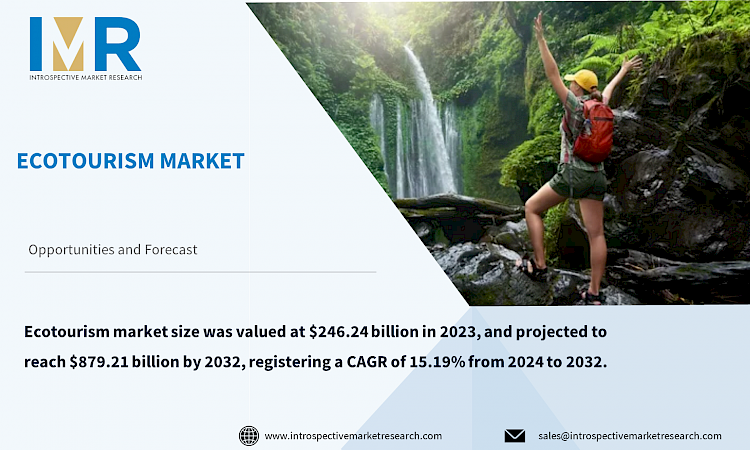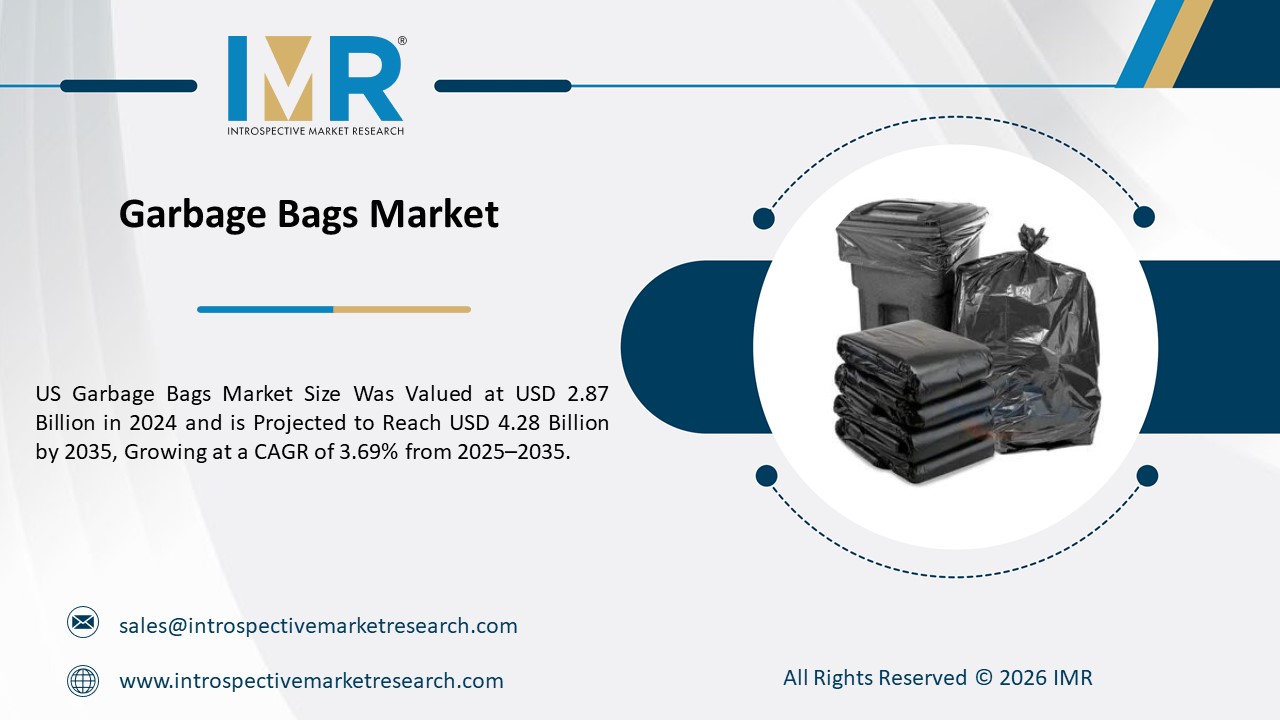Ecotourism Market Synopsis
According to a new report published by Introspective Market Research, titled, ?Ecotourism Market by Activity Type, Traveler Type, Age Group and Sales Channel: Global Opportunity Analysis and Industry Forecast, 2024?2032,?
The global Ecotourism market size was valued at $246.24 billion in 2023, and projected to reach $879.21 billion by 2032, registering a CAGR of 15.19% from 2024 to 2032.
Ecotourism is a sustainable travel mode that prioritizes environmental conservation and responsible tourism practices. It benefits both the environment and local communities, generating income and employment opportunities. Ecotourism involves indigenous people and residents, preserving cultural traditions and creating incentives for environmental protection. It also promotes education about conservation issues, educating travelers about ecosystems, wildlife, and environmental challenges. With increased global awareness of environmental issues like climate change, deforestation, and species extinction, there is a growing interest in eco-friendly travel options. Governments and international organizations have introduced regulations and incentives to promote sustainable tourism, fostering the growth of the ecotourism sector.
According to The Ecotourism Market is segmented into Activity Type, Traveler Type, Age Group, Sales Channel and Region. By Activity Type, the market is categorized into Land and Marine. By Traveler Type, the market is categorized into Solo & Groups. By Age Group, the market is categorized into Generation X, Generation Y, and Generation Z. By Sales Channel, the market is categorized into Travel Agents and direct. By region, it is analyzed across North America (U.S.; Canada; Mexico), Eastern Europe (Bulgaria; The Czech Republic; Hungary; Poland; Romania; Rest of Eastern Europe), Western Europe (Germany; UK; France; Netherlands; Italy; Russia; Spain; Rest of Western Europe), Asia-Pacific (China; India; Japan; Southeast Asia, etc.), South America (Brazil; Argentina, etc.), Middle East & Africa (Saudi Arabia; South Africa, etc.).
Wildlife protection has hindered the growth of the ecotourism industry, as it can harm delicate ecosystems and generate revenue for local communities. To balance visitor access and preservation, strict regulations like restricted visitor numbers and designated pathways are necessary. However, excessive restrictions may discourage tourists and hinder economic benefits. Effective enforcement and education are crucial to ensure responsible ecotourism participation. Collaborative efforts between government bodies, conservationists, and the tourism industry can promote wildlife protection and sustainable ecotourism, preserving nature's wonders for future generations.
Ecotourism promotes sustainable travel by preserving natural environments and supporting local communities. Educational opportunities can enrich travelers' journeys and foster a deeper understanding of the environment. Educational institutions can partner with ecotourism destinations to create hands-on learning experiences, such as field trips, workshops, and research. This collaboration enhances the educational experience and supports the economic sustainability of the region. Ecotourism-driven educational initiatives can also develop eco-conscious travelers, who make informed choices about conservation and sustainable living, such as reducing carbon footprints and supporting ethical tourism practices.
Global Ecotourism Market, Segmentation
The Ecotourism market is segmented based on Activity Type, Traveler Type, Age Group Sales Channel, and region.
Activity Type:
The land segment is expected to dominate the ecotourism market in the forecast period due to its diverse landscapes, accessibility, and rich cultural experiences. Land-based destinations offer diverse landscapes, such as forests, mountains, deserts, and coastal areas, appealing to a wide range of travelers. They are more accessible than marine or underwater destinations, attracting a larger customer base. Ecotourism also offers opportunities for wildlife viewing, cultural experiences, and better infrastructure in terms of accommodations, transportation, and visitor facilities. Overall, land-based ecotourism offers a diverse range of experiences and opportunities for ecotourism enthusiasts.
Age Group:
Generation Y, a generation of digital natives, is increasingly aware of environmental issues like climate change, deforestation, and biodiversity loss. They are more likely to seek eco-friendly travel options and prioritize sustainability and responsible tourism. They are also more likely to choose accommodations, activities, and destinations that prioritize environmental and social responsibility. Their reliance on technology, such as social media, online reviews, and travel apps, makes it easier for them to discover and choose ecotourism options.
Region:
The Asia-Pacific region, with its diverse landscapes and ecologically significant landscapes, attracts ecotourism tourists due to its unique experiences. India, with its rich cultural traditions and indigenous communities, offers authentic experiences for ecotourists, allowing them to engage with local cultures, learn about traditional ecological knowledge, and witness sustainable practices. Governments and local communities recognize the economic potential of ecotourism, generating income and employment opportunities in rural and less-developed areas. Ecotourism often aligns with conservation efforts, as organizations and governments protect and preserve natural resources for the long-term tourism industry's sustainability.
Some of The Leading/Active Market Players Are-
- Frosch International TravelInc. (US)
- Expedia Group Inc. (US)
- Black Kite Tour PLC (US)
- Gondwana Ecotours (US)
- Discover Corps (US)
- ROW Adventures (US)
- Natural Habitat Adventures (US)
- Cheesemans? Ecology Safaris (US)
- Kind Traveler (US)
- Travel Leaders Group LLC (New York), and Other Active Players
Key Industry Developments
- In May 2023, Frosch International Travel acquired Valerie Wilson Travel, a move that brings together two New York City-based agencies run by two generations of families that built their respective brands into multimillion-dollar travel businesses. The Acquisition helped to grow and start, became the luxury travel industry.
- In September 2022, Expedia Group announced its new global social impact and sustainability strategy to advance a travel ecosystem that is responsible, open, and accessible to all. Combining the company?s mission, purpose, and values with its traveler-centric mindset, the Open World social impact and sustainability strategy is focused on three priorities ? increasing access for underserved travelers, democratizing the travel economy, and innovating sustainable solutions for the future of travel.
Key Findings of the Study
- Ecotourism supports environmental conservation and local economies by creating income and employment opportunities while preserving cultural traditions.
- Growing global awareness of environmental issues increases demand for sustainable travel, supported by governmental regulations and incentives.
- Generation Y's environmental consciousness and digital expertise drive the market for eco-friendly travel options, utilizing technology to find sustainable destinations.
- The Asia-Pacific region, especially India, attracts ecotourists with its diverse landscapes and cultural heritage, promoting economic development and conservation efforts through sustainable tourism.






